标签:order line NPU 最小 anti ges new pack spec
关于排序的原文网址:https://algs4.cs.princeton.edu/21elementary/
package sort;
import java.util.Comparator;
public class Selection {
// This class should not be instantiated.
private Selection() { }
/**
* Rearranges the array in ascending order, using the natural order.
* @param a the array to be sorted
*/
public static void sort(Comparable[] a) {
int n = a.length;
for (int i = 0; i < n; i++) {
int min = i;
for (int j = i+1; j < n; j++) {
if (less(a[j], a[min])) min = j;
}
exch(a, i, min);
assert isSorted(a, 0, i);
}
assert isSorted(a);
}
/**
* Rearranges the array in ascending order, using a comparator.
* @param a the array
* @param comparator the comparator specifying the order
*/
public static void sort(Object[] a, Comparator comparator) {
int n = a.length;
for (int i = 0; i < n; i++) {
int min = i;
for (int j = i+1; j < n; j++) {
if (less(comparator, a[j], a[min])) min = j;
}
exch(a, i, min);
assert isSorted(a, comparator, 0, i);
}
assert isSorted(a, comparator);
}
/***************************************************************************
* Helper sorting functions.
***************************************************************************/
// is v < w ?
private static boolean less(Comparable v, Comparable w) {
return v.compareTo(w) < 0;
}
// is v < w ?
private static boolean less(Comparator comparator, Object v, Object w) {
return comparator.compare(v, w) < 0;
}
// exchange a[i] and a[j]
private static void exch(Object[] a, int i, int j) {
Object swap = a[i];
a[i] = a[j];
a[j] = swap;
}
/***************************************************************************
* Check if array is sorted - useful for debugging.
***************************************************************************/
// is the array a[] sorted?
private static boolean isSorted(Comparable[] a) {
return isSorted(a, 0, a.length - 1);
}
// is the array sorted from a[lo] to a[hi]
private static boolean isSorted(Comparable[] a, int lo, int hi) {
for (int i = lo + 1; i <= hi; i++)
if (less(a[i], a[i-1])) return false;
return true;
}
// is the array a[] sorted?
private static boolean isSorted(Object[] a, Comparator comparator) {
return isSorted(a, comparator, 0, a.length - 1);
}
// is the array sorted from a[lo] to a[hi]
private static boolean isSorted(Object[] a, Comparator comparator, int lo, int hi) {
for (int i = lo + 1; i <= hi; i++)
if (less(comparator, a[i], a[i-1])) return false;
return true;
}
// print array to standard output
private static void show(Comparable[] a) {
for (int i = 0; i < a.length; i++) {
System.out.println(a[i]);
}
}
/**
* Reads in a sequence of strings from standard input; selection sorts them;
* and prints them to standard output in ascending order.
*
* @param args the command-line arguments
*/
public static void main(String[] args) {
Integer a[] = new Integer[]{40,20,12,70};
Selection.sort(a);
show(a);
}
}
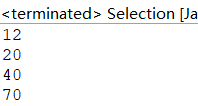
package sort;
import java.util.Comparator;
public class Insertion {
// This class should not be instantiated.
private Insertion() { }
/**
* Rearranges the array in ascending order, using the natural order.
* @param a the array to be sorted
*/
public static void sort(Comparable[] a) {
int n = a.length;
for (int i = 1; i < n; i++) {
for (int j = i; j > 0 && less(a[j], a[j-1]); j--) {
exch(a, j, j-1);
}
assert isSorted(a, 0, i);
}
assert isSorted(a);
}
/**
* Rearranges the subarray a[lo..hi) in ascending order, using the natural order.
* @param a the array to be sorted
* @param lo left endpoint (inclusive)
* @param hi right endpoint (exclusive)
*/
public static void sort(Comparable[] a, int lo, int hi) {
for (int i = lo + 1; i < hi; i++) {
for (int j = i; j > lo && less(a[j], a[j-1]); j--) {
exch(a, j, j-1);
}
}
assert isSorted(a, lo, hi);
}
/**
* Rearranges the array in ascending order, using a comparator.
* @param a the array
* @param comparator the comparator specifying the order
*/
public static void sort(Object[] a, Comparator comparator) {
int n = a.length;
for (int i = 1; i < n; i++) {
for (int j = i; j > 0 && less(a[j], a[j-1], comparator); j--) {
exch(a, j, j-1);
}
assert isSorted(a, 0, i, comparator);
}
assert isSorted(a, comparator);
}
/**
* Rearranges the subarray a[lo..hi) in ascending order, using a comparator.
* @param a the array
* @param lo left endpoint (inclusive)
* @param hi right endpoint (exclusive)
* @param comparator the comparator specifying the order
*/
public static void sort(Object[] a, int lo, int hi, Comparator comparator) {
for (int i = lo + 1; i < hi; i++) {
for (int j = i; j > lo && less(a[j], a[j-1], comparator); j--) {
exch(a, j, j-1);
}
}
assert isSorted(a, lo, hi, comparator);
}
// return a permutation that gives the elements in a[] in ascending order
// do not change the original array a[]
/**
* Returns a permutation that gives the elements in the array in ascending order.
* @param a the array
* @return a permutation {@code p[]} such that {@code a[p[0]]}, {@code a[p[1]]},
* ..., {@code a[p[n-1]]} are in ascending order
*/
public static int[] indexSort(Comparable[] a) {
int n = a.length;
int[] index = new int[n];
for (int i = 0; i < n; i++)
index[i] = i;
for (int i = 1; i < n; i++)
for (int j = i; j > 0 && less(a[index[j]], a[index[j-1]]); j--)
exch(index, j, j-1);
return index;
}
/***************************************************************************
* Helper sorting functions.
***************************************************************************/
// is v < w ?
private static boolean less(Comparable v, Comparable w) {
return v.compareTo(w) < 0;
}
// is v < w ?
private static boolean less(Object v, Object w, Comparator comparator) {
return comparator.compare(v, w) < 0;
}
// exchange a[i] and a[j]
private static void exch(Object[] a, int i, int j) {
Object swap = a[i];
a[i] = a[j];
a[j] = swap;
}
// exchange a[i] and a[j] (for indirect sort)
private static void exch(int[] a, int i, int j) {
int swap = a[i];
a[i] = a[j];
a[j] = swap;
}
/***************************************************************************
* Check if array is sorted - useful for debugging.
***************************************************************************/
private static boolean isSorted(Comparable[] a) {
return isSorted(a, 0, a.length);
}
// is the array a[lo..hi) sorted
private static boolean isSorted(Comparable[] a, int lo, int hi) {
for (int i = lo + 1; i < hi; i++)
if (less(a[i], a[i-1])) return false;
return true;
}
private static boolean isSorted(Object[] a, Comparator comparator) {
return isSorted(a, 0, a.length, comparator);
}
// is the array a[lo..hi) sorted
private static boolean isSorted(Object[] a, int lo, int hi, Comparator comparator) {
for (int i = lo + 1; i < hi; i++)
if (less(a[i], a[i-1], comparator)) return false;
return true;
}
// print array to standard output
private static void show(Comparable[] a) {
for (int i = 0; i < a.length; i++) {
System.out.println(a[i]);
}
}
/**
* Reads in a sequence of strings from standard input; insertion sorts them;
* and prints them to standard output in ascending order.
*
* @param args the command-line arguments
*/
public static void main(String[] args) {
Integer a[] = new Integer[]{80,12,4,95,7};
Insertion.sort(a);
show(a);
}
}
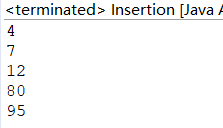
package sort;
public class Shell {
// This class should not be instantiated.
private Shell() { }
/**
* Rearranges the array in ascending order, using the natural order.
* @param a the array to be sorted
*/
public static void sort(Comparable[] a) {
int n = a.length;
// 3x+1 increment sequence: 1, 4, 13, 40, 121, 364, 1093, ...
int h = 1;
while (h < n/3) h = 3*h + 1;
while (h >= 1) {
// h-sort the array
for (int i = h; i < n; i++) {
for (int j = i; j >= h && less(a[j], a[j-h]); j -= h) {
exch(a, j, j-h);
}
}
assert isHsorted(a, h);
h /= 3;
}
assert isSorted(a);
}
/***************************************************************************
* Helper sorting functions.
***************************************************************************/
// is v < w ?
private static boolean less(Comparable v, Comparable w) {
return v.compareTo(w) < 0;
}
// exchange a[i] and a[j]
private static void exch(Object[] a, int i, int j) {
Object swap = a[i];
a[i] = a[j];
a[j] = swap;
}
/***************************************************************************
* Check if array is sorted - useful for debugging.
***************************************************************************/
private static boolean isSorted(Comparable[] a) {
for (int i = 1; i < a.length; i++)
if (less(a[i], a[i-1])) return false;
return true;
}
// is the array h-sorted?
private static boolean isHsorted(Comparable[] a, int h) {
for (int i = h; i < a.length; i++)
if (less(a[i], a[i-h])) return false;
return true;
}
// print array to standard output
private static void show(Comparable[] a) {
for (int i = 0; i < a.length; i++) {
System.out.println(a[i]);
}
}
/**
* Reads in a sequence of strings from standard input; Shellsorts them;
* and prints them to standard output in ascending order.
*
* @param args the command-line arguments
*/
public static void main(String[] args) {
Integer a[] = new Integer[]{40,50,12,70,6};
Shell.sort(a);
show(a);
}
}
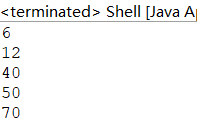
package sort;
import java.util.Comparator;
public class Merge {
// This class should not be instantiated.
private Merge() { }
// stably merge a[lo .. mid] with a[mid+1 ..hi] using aux[lo .. hi]
private static void merge(Comparable[] a, Comparable[] aux, int lo, int mid, int hi) {
// precondition: a[lo .. mid] and a[mid+1 .. hi] are sorted subarrays
assert isSorted(a, lo, mid);
assert isSorted(a, mid+1, hi);
// copy to aux[]
for (int k = lo; k <= hi; k++) {
aux[k] = a[k];
}
// merge back to a[]
int i = lo, j = mid+1;
for (int k = lo; k <= hi; k++) {
if (i > mid) a[k] = aux[j++];
else if (j > hi) a[k] = aux[i++];
else if (less(aux[j], aux[i])) a[k] = aux[j++];
else a[k] = aux[i++];
}
// postcondition: a[lo .. hi] is sorted
assert isSorted(a, lo, hi);
}
// mergesort a[lo..hi] using auxiliary array aux[lo..hi]
private static void sort(Comparable[] a, Comparable[] aux, int lo, int hi) {
if (hi <= lo) return;
int mid = lo + (hi - lo) / 2;
sort(a, aux, lo, mid);
sort(a, aux, mid + 1, hi);
merge(a, aux, lo, mid, hi);
}
/**
* Rearranges the array in ascending order, using the natural order.
* @param a the array to be sorted
*/
public static void sort(Comparable[] a) {
Comparable[] aux = new Comparable[a.length];
sort(a, aux, 0, a.length-1);
assert isSorted(a);
}
/***************************************************************************
* Helper sorting function.
***************************************************************************/
// is v < w ?
private static boolean less(Comparable v, Comparable w) {
return v.compareTo(w) < 0;
}
/***************************************************************************
* Check if array is sorted - useful for debugging.
***************************************************************************/
private static boolean isSorted(Comparable[] a) {
return isSorted(a, 0, a.length - 1);
}
private static boolean isSorted(Comparable[] a, int lo, int hi) {
for (int i = lo + 1; i <= hi; i++)
if (less(a[i], a[i-1])) return false;
return true;
}
/***************************************************************************
* Index mergesort.
***************************************************************************/
// stably merge a[lo .. mid] with a[mid+1 .. hi] using aux[lo .. hi]
private static void merge(Comparable[] a, int[] index, int[] aux, int lo, int mid, int hi) {
// copy to aux[]
for (int k = lo; k <= hi; k++) {
aux[k] = index[k];
}
// merge back to a[]
int i = lo, j = mid+1;
for (int k = lo; k <= hi; k++) {
if (i > mid) index[k] = aux[j++];
else if (j > hi) index[k] = aux[i++];
else if (less(a[aux[j]], a[aux[i]])) index[k] = aux[j++];
else index[k] = aux[i++];
}
}
/**
* Returns a permutation that gives the elements in the array in ascending order.
* @param a the array
* @return a permutation {@code p[]} such that {@code a[p[0]]}, {@code a[p[1]]},
* ..., {@code a[p[N-1]]} are in ascending order
*/
public static int[] indexSort(Comparable[] a) {
int n = a.length;
int[] index = new int[n];
for (int i = 0; i < n; i++)
index[i] = i;
int[] aux = new int[n];
sort(a, index, aux, 0, n-1);
return index;
}
// mergesort a[lo..hi] using auxiliary array aux[lo..hi]
private static void sort(Comparable[] a, int[] index, int[] aux, int lo, int hi) {
if (hi <= lo) return;
int mid = lo + (hi - lo) / 2;
sort(a, index, aux, lo, mid);
sort(a, index, aux, mid + 1, hi);
merge(a, index, aux, lo, mid, hi);
}
// print array to standard output
private static void show(Comparable[] a) {
for (int i = 0; i < a.length; i++) {
System.out.println(a[i]);
}
}
/**
* Reads in a sequence of strings from standard input; mergesorts them;
* and prints them to standard output in ascending order.
*
* @param args the command-line arguments
*/
public static void main(String[] args) {
Integer a[] = new Integer[]{4,80,30,7};
Merge.sort(a);
show(a);
}
}
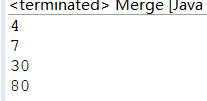
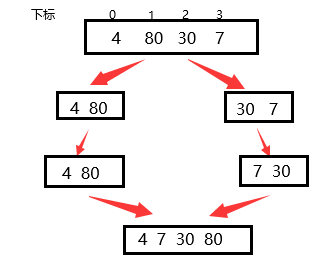
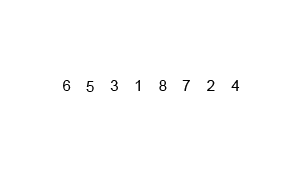
标签:order line NPU 最小 anti ges new pack spec
原文地址:https://www.cnblogs.com/Monster-su/p/14512684.html